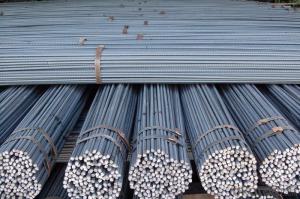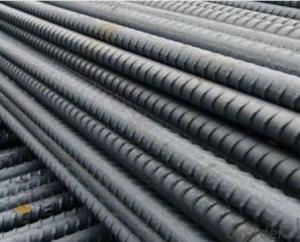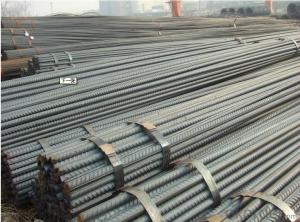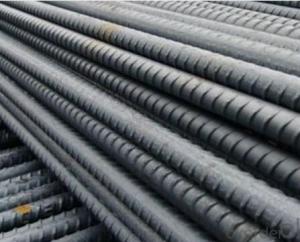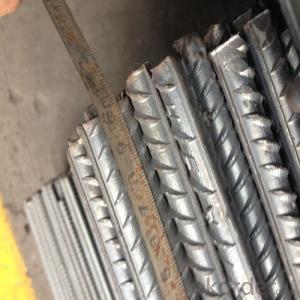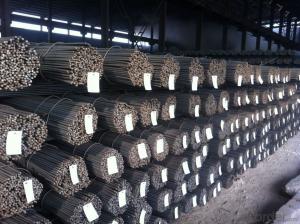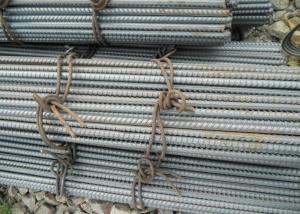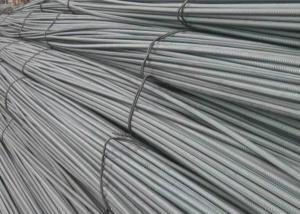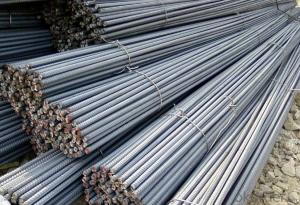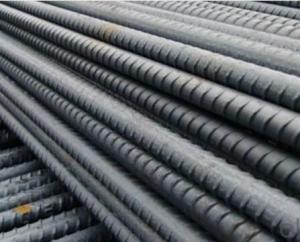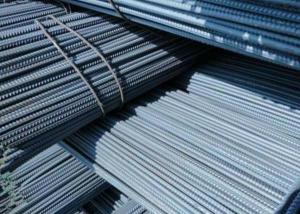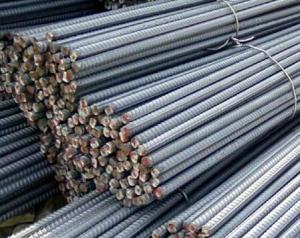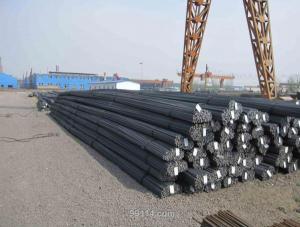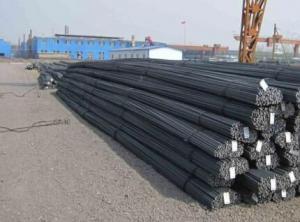High Quality Steel Deformed Bar HRB400 18/20/22mm
- Loading Port:
- Tianjin
- Payment Terms:
- TT or LC
- Min Order Qty:
- 100 m.t
- Supply Capability:
- 10000 m.t/month
OKorder Service Pledge
OKorder Financial Service
You Might Also Like
High Quality Steel Deformed Bar HRB400 18/20/22mm
Product Description:
Specifications of High Quality Steel Deformed Bar HRB400 18/20/22mm:
Standard | GB | HRB400 | |
Diameter | 18mm,20mm, 22mm | ||
Length | 6M, 12M | ||
Place of origin | Hebei, China mainland | ||
Advantages | exact size, regular package, chemical and mechanical properties are stable. | ||
Type | Hot rolled deformed steel bar | ||
Chemical Composition of High Quality Steel Deformed Bar HRB400 18/20/22mm: (Please kindly find our chemistry of our material based on HRB400 as below for your information)
Grade | Technical data of the original chemical composition (%) | ||||||
C | Mn | Si | S | P | V | ||
HRB400 | ≤0.25 | ≤1.60 | ≤0.80 | ≤0.045 | ≤0.045 | 0.04-0.12 | |
Physical capability | |||||||
Yield Strength (N/cm²) | Tensile Strength (N/cm²) | Elongation (%) | |||||
≥400 | ≥570 | ≥14 | |||||
Theoretical weight and section area of High Quality Steel Deformed Bar HRB400 18/20/22mm as below for your information:
Diameter(mm) | Section area (mm²) | Mass(kg/m) | Weight of 12m bar(kg) |
18 | 254.5 | 2.00 | 24 |
20 | 314.2 | 2.47 | 29.64 |
22 | 380.1 | 2.98 | 35.76 |
Usage and Applications of High Quality Steel Deformed Bar HRB400 18/20/22mm:
Deformed bar is widely used in buildings, bridges, roads and other engineering construction. Big to highways, railways, bridges, culverts, tunnels, public facilities such as flood control, dam, small to housing construction, beam, column, wall and the foundation of the plate, deformed bar is an integral structure material. With the development of world economy and the vigorous development of infrastructure construction, real estate, the demand for deformed bar will be larger and larger.
Packaging & Delivery of High Quality Steel Deformed Bar HRB400 18/20/22mm:
Packaging Detail: products are packed in bundle and then shipped by container or bulk vessel, deformed bar is usually naked strapping delivery, when storing, please pay attention to moisture proof. The performance of rust will produce adverse effect.
Each bundle weight: 2-3MT, or as required
Payment term: TT or L/C
Delivery Detail: within 45 days after received advanced payment or LC.
Label: to be specified by customer, generally, each bundle has 1-2 labels
Trade terms: FOB, CFR, CIF
FAQ:
Q1: Why buy Materials & Equipment from OKorder.com?
A1: All products offered byOKorder.com are carefully selected from China's most reliable manufacturing enterprises. Through its ISO certifications, OKorder.com adheres to the highest standards and a commitment to supply chain safety and customer satisfaction.
Q2: How do we guarantee the quality of our products?
A2: We have established an advanced quality management system which conducts strict quality tests at every step, from raw materials to the final product. At the same time, we provide extensive follow-up service assurances as required.
Q3: How soon can we receive the product after purchase?
A3: Within three days of placing an order, we will arrange production. The shipping date is dependent upon the quatity, how many sizes you want and the plan of production, but is typically 1 month to 2 month days from the beginning of production.
Images of High Quality Steel Deformed Bar HRB400 18/20/22mm:
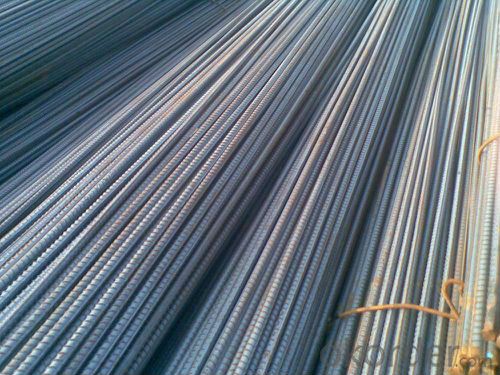
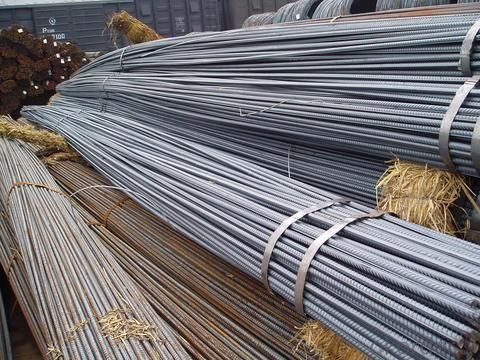
*If you would like to get our price, please inform us the size, standard/material and quantity. Thank you very much for your attention.
- Q:How do steel rebars affect the overall noise insulation of a structure?
- The overall noise insulation of a structure is minimally affected by steel rebars. This is because noise insulation primarily relies on the density and thickness of the construction materials used for walls, floors, and ceilings. Steel rebars, which are used to reinforce concrete structures, do not make a significant contribution to a building's sound insulation properties. The main purpose of steel rebars is to provide strength and stability to the concrete, ensuring its structural integrity. They are typically embedded within the concrete, thus present throughout the building's framework. However, steel rebars themselves do not possess any sound-absorbing or sound-blocking characteristics. To enhance the noise insulation of a structure, other materials specifically designed for sound insulation, such as insulation boards, acoustic panels, or soundproofing materials, need to be incorporated into the building design. These materials are intended to absorb or block sound waves, reducing the transmission of noise from one area to another. Although steel rebars do not directly contribute to noise insulation, they indirectly play a role in maintaining the overall structural integrity of a building. A well-constructed and sturdy structure can help minimize vibrations and sound transmission caused by external noise sources. Therefore, while steel rebars themselves do not significantly affect noise insulation, their presence indirectly contributes to a more solid and stable building, which can help reduce structural vibrations and unwanted noise.
- Q:How do steel rebars improve the load-carrying capacity of concrete?
- Steel rebars improve the load-carrying capacity of concrete by providing additional tensile strength. When concrete is subjected to heavy loads or forces, it tends to crack under tension. The inclusion of steel rebars within the concrete helps to counteract this weakness by absorbing the tensile forces and distributing them throughout the structure. This reinforcement enhances the overall durability and structural integrity of the concrete, allowing it to bear heavier loads without failing.
- Q:Can steel rebars be used in structures with limited construction regulations?
- Steel rebars can be used in structures with limited construction regulations, but it is important to note that the safety and structural integrity of the building may be compromised without proper regulations. Steel rebars are commonly used as reinforcement in concrete structures to provide strength and stability. However, the use of rebars alone does not guarantee the safety of a structure. Construction regulations exist to ensure that buildings are designed and constructed to withstand various forces and loads, such as wind, earthquakes, and live loads. These regulations also cover aspects such as fire safety, electrical systems, and accessibility. Without these regulations, there is a higher risk of structural failure or other safety issues. Using steel rebars in structures without proper construction regulations may result in buildings that are not adequately designed or constructed to withstand these forces and loads. This can lead to structural failure, collapse, or other hazards. It is therefore advisable to adhere to local construction codes and regulations to ensure the safety and longevity of any structure.
- Q:How are steel rebars cut and shaped on-site?
- Steel rebars are typically cut and shaped on-site using handheld tools such as rebar cutters and benders. Rebar cutters are used to accurately cut the rebars to the required length, while rebar benders are used to shape the rebars into various configurations such as bends, hooks, or stirrups. These tools allow construction workers to customize the rebars according to the specific needs of the project, ensuring a precise and efficient installation.
- Q:What are the advantages of using fiber-reinforced polymer (FRP) rebars over steel rebars?
- There are several advantages of using fiber-reinforced polymer (FRP) rebars over steel rebars. Firstly, FRP rebars are significantly lighter than steel rebars, making them easier to handle and transport. Additionally, FRP rebars have a higher tensile strength than steel rebars, allowing for greater flexibility in design and reducing the need for additional reinforcement. FRP rebars are also non-corrosive, unlike steel rebars which can rust over time, making them more durable and longer-lasting. Lastly, FRP rebars are non-conductive, making them suitable for use in areas with electrical or magnetic fields. Overall, the use of FRP rebars offers numerous advantages in terms of weight, strength, durability, and versatility.
- Q:How do steel rebars prevent corrosion in concrete structures?
- Passivation is a crucial process in preventing corrosion in concrete structures, and steel rebars are the key components responsible for this. By forming a thin oxide layer on their surface, the rebars act as a barrier against corrosion-causing agents. When embedded in concrete, steel rebars benefit from the alkaline environment created by the cement paste, which aids in passivation. The concrete's high pH level prompts the formation of a protective layer of iron oxide, effectively shielding the rebars from moisture and oxygen. Moreover, well-constructed concrete possesses a dense and impermeable nature that restricts the movement of water and other corrosive substances towards the rebars. Consequently, the likelihood of corrosion initiation and progression is significantly reduced. In addition to the alkaline environment and concrete's impermeability, steel rebars are commonly coated with epoxy or zinc, providing an extra layer of protection. These coatings enhance the steel's resistance to corrosion, especially in aggressive environments like marine or chloride-rich conditions. To ensure the long-term prevention of corrosion in concrete structures, regular maintenance and preventive measures are essential. Proper concrete cover over the rebars and the avoidance of excessive moisture or chloride ions are crucial factors in this regard.
- Q:Are there any disadvantages to using steel rebars?
- Yes, there are some disadvantages to using steel rebars. Firstly, steel rebars can corrode over time, especially in environments with high moisture or exposure to chemicals, which can reduce their strength and durability. Additionally, steel rebars are susceptible to thermal expansion and contraction, leading to cracking in concrete structures. Moreover, steel rebars are heavy and can be challenging to handle and transport, making construction processes more labor-intensive.
- Q:Are steel rebars suitable for use in industrial structures?
- Yes, steel rebars are suitable for use in industrial structures. Steel rebars, also known as reinforcing bars, are commonly used in the construction industry to provide added strength and stability to concrete structures. They are made from high-strength steel and have excellent tensile strength, making them ideal for reinforcing concrete in industrial structures that are subject to heavy loads, vibrations, or other dynamic forces. Steel rebars also have good ductility and can withstand bending without breaking, which is important in industrial structures where high structural integrity is required. Additionally, steel rebars have good resistance to corrosion, which is essential in industrial environments where exposure to moisture, chemicals, or other corrosive agents is common. Overall, steel rebars are a reliable and durable choice for reinforcing industrial structures, ensuring their long-term structural stability and safety.
- Q:What is the cost of steel rebars per ton?
- The cost of steel rebars per ton can vary depending on several factors such as market conditions, supplier, quality, and location. It is recommended to consult with local suppliers or check current market prices for accurate and up-to-date information.
- Q:Can steel rebars be used in wastewater treatment plants?
- Yes, steel rebars can be used in wastewater treatment plants. Steel rebars are commonly used as reinforcement for concrete structures, including those found in wastewater treatment plants. The rebars provide strength and durability to the structures, ensuring they can withstand the harsh environments and corrosive nature of wastewater. However, it is important to select the appropriate grade of steel rebars that are resistant to corrosion caused by the chemicals present in wastewater.
1. Manufacturer Overview |
|
|---|---|
| Location | |
| Year Established | |
| Annual Output Value | |
| Main Markets | |
| Company Certifications | |
2. Manufacturer Certificates |
|
|---|---|
| a) Certification Name | |
| Range | |
| Reference | |
| Validity Period | |
3. Manufacturer Capability |
|
|---|---|
| a)Trade Capacity | |
| Nearest Port | |
| Export Percentage | |
| No.of Employees in Trade Department | |
| Language Spoken: | |
| b)Factory Information | |
| Factory Size: | |
| No. of Production Lines | |
| Contract Manufacturing | |
| Product Price Range | |
Send your message to us
High Quality Steel Deformed Bar HRB400 18/20/22mm
- Loading Port:
- Tianjin
- Payment Terms:
- TT or LC
- Min Order Qty:
- 100 m.t
- Supply Capability:
- 10000 m.t/month
OKorder Service Pledge
OKorder Financial Service
Similar products
New products
Hot products
Related keywords
